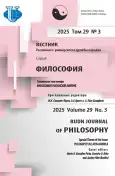The Phenomenology of War by Wilhelm Schapp
- Authors: Popov E.A.1
-
Affiliations:
- Altai State University
- Issue: Vol 29, No 3 (2025): PHILOSOPHY IN LATIN AMERICA
- Pages: 832-844
- Section: HISTORY OF PHILOSOPHY
- URL: https://journal-vniispk.ru/2313-2302/article/view/325477
- DOI: https://doi.org/10.22363/2313-2302-2025-29-3-832-844
- EDN: https://elibrary.ru/DQAVHP
- ID: 325477
Cite item
Full Text
Abstract
One of Husserl’s students, the German thinker Wilhelm Schapp (1884-1965), offered his own perspective on the phenomenology of war. In a number of his works devoted to the phenomenology of history, he made a digression in favor of the unconditional factual subject of comprehension - war. Gradually, an independent research approach is revealed in his works, which is partly consistent with the conceptual provisions common to phenomenology, but also has its own original touches. Schapp analyzes war in a system of well-known categories and concepts of phenomenology - transcendence, transcendence and others. But at the same time, he focuses on the deployment of war as one of the substantial foundations of existence, presents this phenomenon as a world of things subject to transcendence, as an essential phenomenon. It is noteworthy that Schapp does not give any specific definition of war, probably avoiding the historicity, eventfulness and facticity characteristic of describing wars in a generalized or concretized form. Nevertheless, there is a clear pattern in the provisions formulated by him, which makes it possible to judge the conceptual design of his approach. The following provisions are meant: (1) overcoming the prevailing ethical format of the reception of war; (2) identification of war as an essential phenomenon - an integral part of being; (3) the deployment of war as the world of things, realized through the act of transcendence. In his approach to the phenomenology of war, Schapp managed to integrate eventfulness, the subject/subjective principle of being, experience as a way of evaluating being, and the experience of being. The article shows that Schapp consistently and accentuated the place of war in a number of other foundations of existence, such as space, nature, the universe and others. The thinker paid special attention to the experience of being as the basis for understanding the war.
About the authors
Evgeniy A. Popov
Altai State University
Author for correspondence.
Email: popov.eug@yandex.ru
ORCID iD: 0000-0003-3324-8101
SPIN-code: 4672-6381
DSc in Philosophy, Professor, Professor of the Department of Sociology and Conflictology
61 Lenin Ave., Barnaul, 656049, Russian FederationReferences
- Dunlop F. Absolute Stellungnahmen: Eine Ontische Untersuchung Ueber Das Wesen Der Religion, by Kurt Stavenhagen. Journal of the British Society for Phenomenology. 1981;12(1):98-100. https://doi.org/10.1080/00071773.1981.11007529
- Wood R. Affirming Difference: Everyday Aesthetic Experience after Phenomenology. Contemporary Aesthetics. 2011;(9):112-126.
- Herbstrith W. Edith Stein, a biography. San Francisco: Harper & Row; 1985.
- Geniusas S. War as a phenomenological Theme: methodological and metaphysical Considerations. HORIZON. Phenomenological research. 2022;11(1):379-401. https://doi.org/10.21638/2226-5260-2022-11-379-401 EDN: OREKLG
- Nuccilli D. History and Stories: Schapp’s Ontological Conception of the Entanglement. Bratislava: Kritika and Kontext; 2018.
- Brighton S. Three Propositions about Phenomenology of War. International Political Sociology. 2011;5(1):101-105. https://doi.org/10.1111/j.1749-5687.2011.00122_6.x
- Joisten К, Schapp J, Thiemer N, editors. Wilhelm Schapp. On the way of a philosophy of stories. Pt. I. Freiburg; Munich: Verlag Karl Alber; 2016.
- Schapp V. In Geschichten verstrickt. Zum Sein von Mensch und Ding. Frankfurt am Main: Verlag Vittorio Klostermann; 2012.
- Schapp V. Beitrage Zur Phanomenologie Der Wahrnehmung. Frankfurt am Main: Verlag Vittorio Klostermann; 2013.
- Ha PK. Beyond words, things, thoughts, feelings: essays on aesthetic experience. Portland: Sussex Academic Press; 2011.
- Schapp V. Die neue Wissenschaft vom Recht. Eine phaenomenologosche Untersuchung. Berlin-Grunewald: Rothschild publ.; 1930.
- Joisten К, Schapp J, Thiemer N, editors. Wilhelm Schapp. On the way of a philosophy of stories. Pt. II. Freiburg; Munich: Verlag Karl Alber; 2017.
- Klauzevic K. About the war. Moscow: Gosvoenizdat publ.; 1934. (In Russian).
- Kruglov AN. Hegel’s Bellicist view of war. Mature works. RUDN Journal of Philosophy. 2023;27(2):390-405. (In Russian). https://doi.org/10.22363/2313-2302-2023-27-2-390-405 EDN: HVSUPU
- Gilks M. A Phenomenology of War: A Theoretical Inquiry into the Existential-Hermeneutic Structure of War, with Empirical Reflections on the case of the British Soldier in Afghanistan. Available from: https://kar.kent.ac.uk/102011/2023 (accessеd: 17.03.2024).
- Suvalko A. Book review: Lubbe G. “Keeping up with the times: a shortened stay in the present”. Sociologicheskoe obozrenie. 2017;16(2):360-365. (In Russian).
- Popov EA. Aesthetic experience in the concepts of R. Ingarden, V. Chapet and K. Stavenhagen. RUDN Journal of Philosophy. 2022;26(4):821-834. (In Russian). https://doi.org/10.22363/2313-2302-2022-26-4-821-834 EDN: NWXMXD
- Sylvester K. Experiencing the war. London: Rutledge; 2011. https://doi.org/10.4324/9780203839997
- Sepp HR. Die Grenze der Solidarität: Der erste Weltkrieg und die Phänomenologie. Tijdschrift voor Filosofie. 2014;76(4):761-793.
- Simon H, Brock L. The Justification of War and International Order: From Past to Present. Oxford: Oxford University Press; 2021. https://doi.org/10.1093/oso/9780198865308.001.0001
- Yoshikawa T. Husserl’s Idealism in the Caizo Articles and Its Relation to Contemporary Moral Perfectionism. In: The Palgrave Handbook of German Idealism and Phenomenology. Palgrave: Macmillan; 2021. P. 233-256. https://doi.org/10.1007/978-3-030-66857-0_11
Supplementary files









